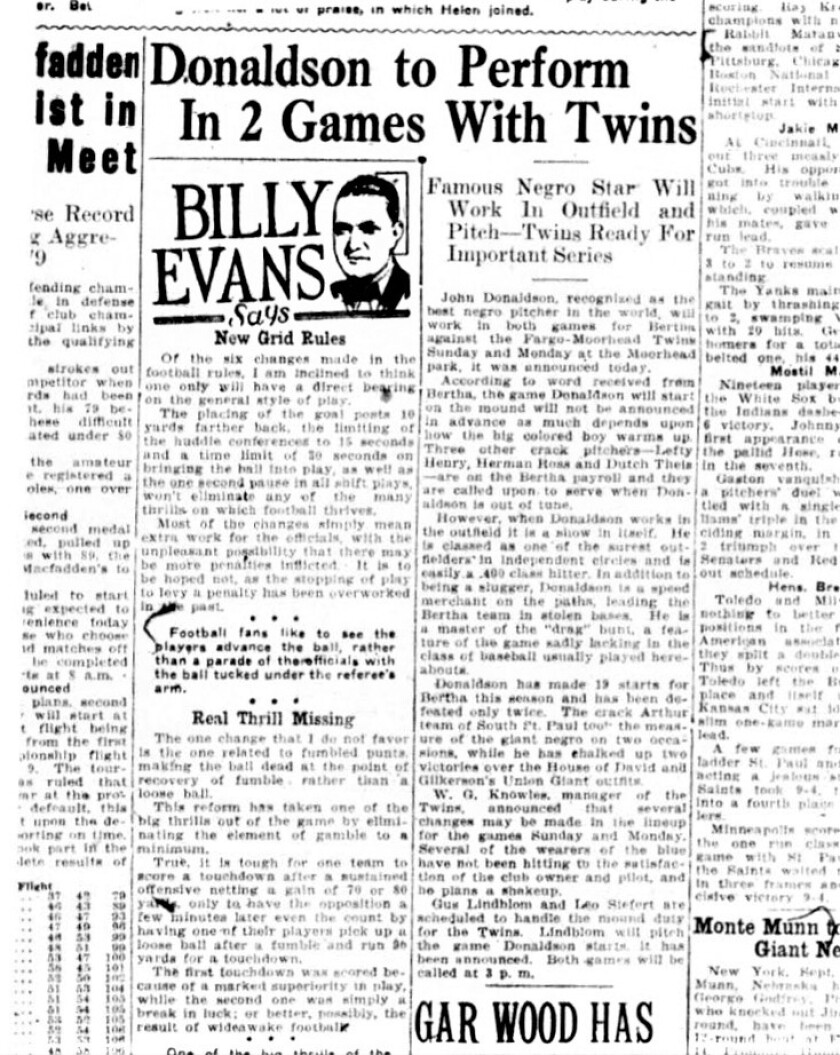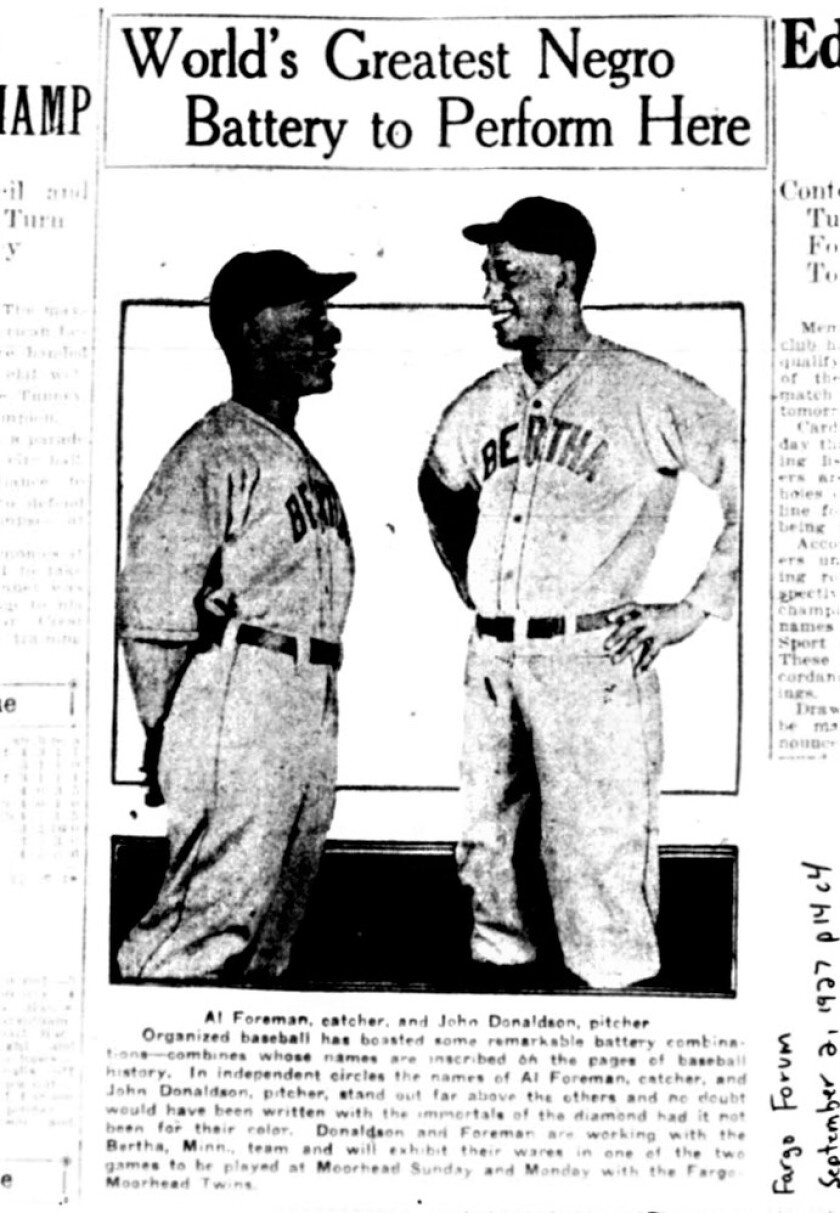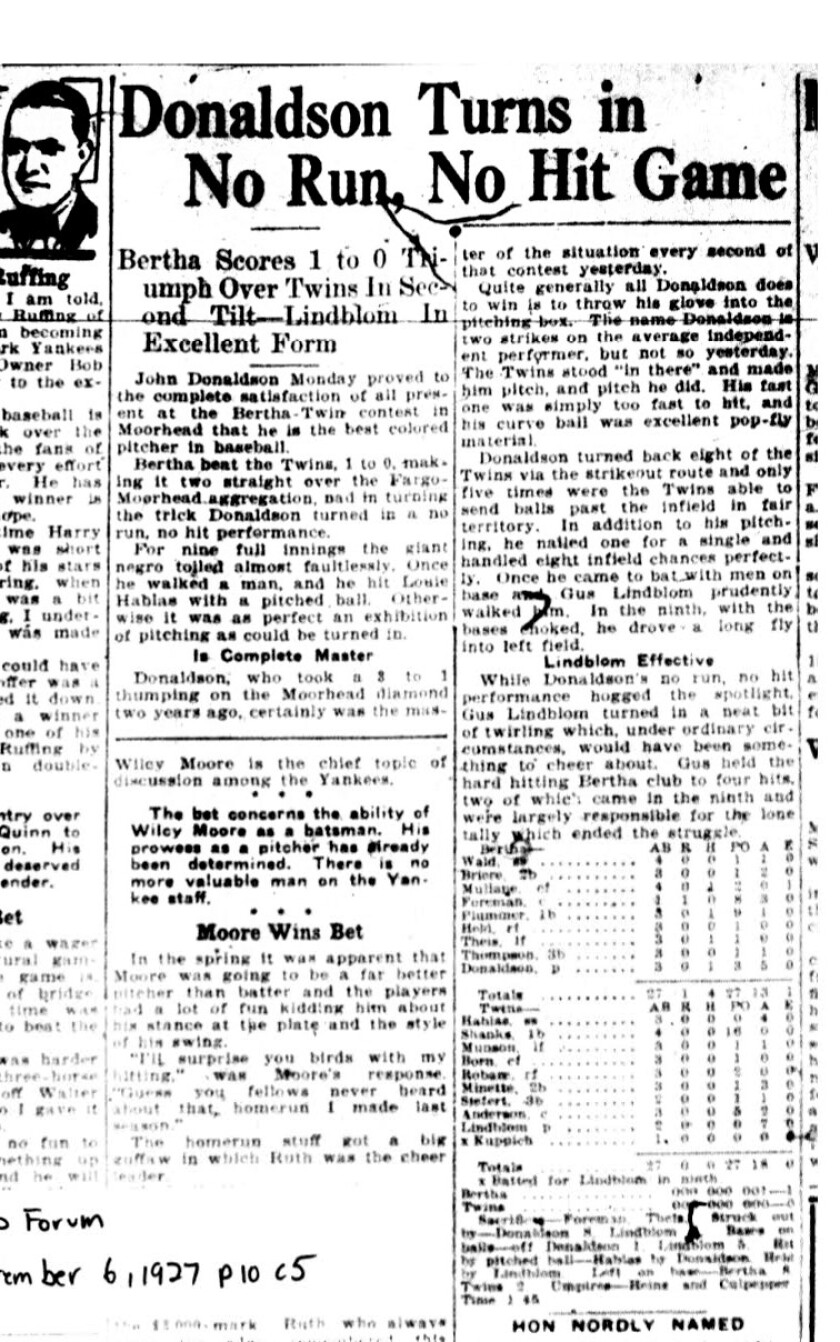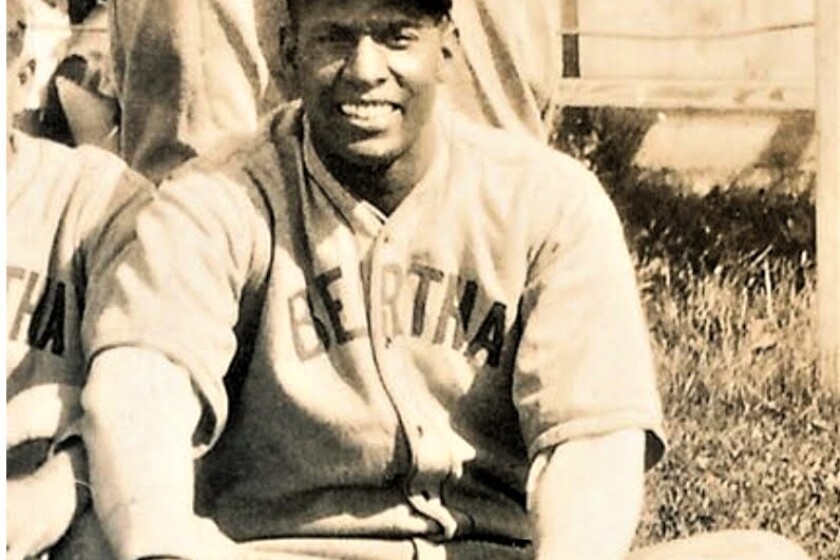MOORHEAD, Minn. — A Minnesota legend might be elected to the National Baseball Hall of Fame this weekend, which should be a cause for celebration from Moorhead to Minneapolis, from Fergus Falls to Fairmont, from Bertha to Breckenridge.
It's likely you've never heard of him.
That makes clear we're not talking about Tony Oliva or Jim Kaat or Hibbing-born Roger Maris, all of whom might make the revered Hall via the Golden Days Era Committee ballot results that will be announced Sunday, Dec. 5.
Those players are all rightly celebrated.
John Donaldson is not.
ADVERTISEMENT
Which is one of the great crimes of baseball, particularly here in Minnesota and the Upper Midwest where Donaldson was one of the most famous ballplayers of his era and a significant figure in the game's history.
"John Donaldson made it possible for Jackie Robinson to break the color barrier," says Peter Gorton of New Brighton, Minnesota, an enthusiastic and obsessive supporter of Donaldson who more than two decades ago started The Donaldson Network , a website dedicated to documenting the ballplayer's greatness.
Donaldson, who pitched for several years for the local team in Bertha, Minnesota, and is documented to have played in at least 130 towns across Minnesota, is on the Early Baseball Era Committee ballot for induction into the Hall of Fame.
The results of the Early Baseball Era Committee vote and the Golden Days Era Committee vote will be announced live on MLB Network’s "MLB Tonight" at 5 p.m. Sunday.
You've heard of Robinson, who became the first Black player in the big leagues when he took the field for the Brooklyn Dodgers in 1947.
So why have you never heard of Donaldson, a Black left-handed pitcher born in Missouri in 1891, who according to Gorton's and others' research won more than 400 games and recorded more than 5,000 strikeouts?
ADVERTISEMENT
Because Donaldson never played in the major leagues, nor did he come close. Instead, his career from 1908 to 1940 was mostly spent barnstorming the country, pitching and playing outfield for whatever small-town teams would pay him.
His opponents were independent or minor-league squads whose owners were looking to make a few bucks off the attraction of "the greatest colored baseball player of today and all time." That included, by the way, the old Fargo-Moorhead Twins of the Northern League. More on that later.
Donaldson did play some in the Negro Leagues and was one of the founders of the famed Kansas City Monarchs. But for a Black ballplayer during his playing days, there was better money to be made by barnstorming, the practice of traveling from town to town and playing whoever would play you.
"We've documented he played in at least 725 cities in the United States and Canada," Gorton said. "He was really the first Black star. He was the first African-American player who crossed over the color barrier."
Indeed, prominent Negro Leagues player Buck O'Neil — also on this year's Early Baseball ballot — wrote in his autobiography that Donaldson influenced and paved the way for Satchel Paige, perhaps the most famous early Black ballplayer.
"He showed Satchel the way, and the fact is there are many people who saw them both who say John Donaldson was just as good as Satchel," O'Neil wrote.
ADVERTISEMENT
Donaldson's numbers are simply astounding. Gorton's team, using mostly newspaper articles and box scores, have verified 422 victories, 5,181 strikeouts, 14 no-hitters and two perfect games. He threw 30 consecutive no-hit innings in 1915 and struck out 30 or more batters in a single game twice.
One of the no-hitters came Sept. 5, 1927, in Fargo, when Donaldson and his Bertha team played a pair of games against the Fargo-Moorhead Twins.

In a Fargo Forum article from Sept. 3, previewing the ballgames, Donaldson is referred to as "the best negro pitcher in the world."
The Donaldson Network website — johndonaldson.bravehost.com — is a remarkable feat of research. It lists every documented game Donaldson played, including his victories and strikeouts. He crisscrossed Minnesota, North Dakota, South Dakota and Iowa playing ball and mowing down opposing batters.
In addition to Bertha, he played for Minnesota towns like Melrose, Madison and Minneota.
He had 14 strikeouts in Devils Lake, North Dakota, on July 23, 1916. Fifteen strikeouts in Alexandria, Minnesota, on Aug. 9, 1925. Seven strikeouts in Brookings, South Dakota, on Aug. 26, 1926. The list goes on.
ADVERTISEMENT
Donaldson played games in Breckenridge, Fergus Falls, Detroit Lakes, Perham, Wadena, Browns Valley, Battle Lake, Hancock, Sauk Centre, Bemidji, Long Prairie and dozens of other Minnesota cities and towns.
He was a main attraction when he came to Fargo-Moorhead.
"World's Greatest Negro Battery to Perform Here," touted a headline in the Sept. 2, 1927, Fargo Forum.

Catcher Al Foreman and pitcher Donaldson are shown in a large photograph at the top of the sports page, smiling and wearing their Bertha uniforms. The caption says Foreman and Donaldson "no doubt would have been written with the immortals of the diamond had it not been for their color."
The Donaldson Network and Gorton's admitted obsession with the obscure pitcher began in 2002, when Gorton received a call from his former social studies teacher and now Minnesota State University Moorhead history professor Steven Hoffbeck, who was working on a book called "Swinging for the Fences: Black Baseball in Minnesota." Hoffbeck wanted Gorton, then working as a communications professional for a law firm in the Twin Cities, to write a chapter on Donaldson.
Gorton grew up in Staples, about 20 miles northeast of Bertha in central Minnesota, so he went to Bertha and poked around the town's historical society. He came across a poster of Donaldson playing for Bertha in the 1920s. That launched Gorton's fixation.
ADVERTISEMENT
As Gorton tells it, Bertha chamber of commerce types were trying to put the Todd County town on the map.

"These small towns around the state were growing and they were trying to become more relevant. One of the ways to do that was to get famous Black baseball players to play for your town," Gorton said. "You draw people to your town for the games. Instead of drawing 500, all of the sudden you're drawing 1,000 or 5,000. You're boosting the economy and all the Twin Cities newspapers are writing about it. 'What's going on in Bertha?'"
Gorton says what began as an obsession became a responsibility, calling what he and his team of volunteer researchers have done "legacy restoration."
In 2004, Gorton discovered Donaldson, who died in 1970 at age 79, was buried in an unmarked grave in Chicago. Enough money was raised, with the help of Chicago White Sox owner Jerry Reinsdorf and former major league manager Don Zimmer, among others, to get Donaldson a tombstone.
In 2010, Gorton learned of a 39-second movie clip of Donaldson pitching in Fergus Falls, important because it gives younger people a visual to which they can relate.
Donaldson was considered for the Hall of Fame once before, in 2006, but that was when voters knew only a fraction of what they know now.
ADVERTISEMENT
Somewhere along the line, a research and writing project became a campaign to get Donaldson in the Hall of Fame. Gorton quit his job five years ago to devote himself fully to Donaldson research and promotion.
It's possible that goal is realized Sunday if Donaldson received 12 of 16 committee votes, but even if Donaldson doesn't make it, Gorton said lifting the great ballplayer from obscurity to the cusp of immortality was worth it.
"We found his unmarked grave in Chicago and now we've got him to the steps of the Baseball Hall of Fame," Gorton said. "Getting into the Hall of Fame won't define who John Donaldson was. We know who he was.
"John Donaldson has had a profound influence on baseball in this state, baseball in this nation and baseball internationally. He made money and became famous despite having zero opportunity to play in the major leagues. He was a Black ballplayer who went mainstream when it was a hard time to be a Black man in America, particularly one of renown. His impact on baseball and crossing over the color barrier makes him culturally important. He made Jackie Robinson possible."
Baseball writer Joe Posnanski of The Athletic was taken by what he called Donaldson's "overpowering dignity."
Gorton's team discovered that, in 1917, one club owner wanted to sneak Donaldson into the major leagues by claiming he was Cuban (which was acceptable by baseball's standards at the time). Donaldson refused and said these extraordinary words to explain his decision:
"I am not ashamed of my color. There is no woman whom I love more than my mother. I am light enough so that baseball men told me before I became known that I could be passed off as Cuban. It would have meant renouncing my family. One of the agreements was that I was never again to visit my mother or have anything to do with colored people. I refused.
"I am clean morally and physically. I go to church and contribute my share, I keep my body and mind clean. And yet when I go out there to play baseball, it is not unusual to hear some fans cry out, 'Hit the dirty n—.' That hurts, for I have no recourse. I am getting paid, I suppose, to take that. But why should fans become personal? If I act the part of a gentleman, am I not entitled to a little respect?"









